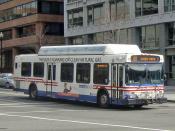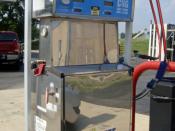Introduction
With fuel costs rising, Alternate Fuel Vehicles (AFV) are becoming more and more attractive to the consumer. After investigation, it is the opinion of Team B that Lotus Car Rental Corporation should invest in the purchase of a small fleet of these cars in a test marketing effort. This paper discusses the physical advantages and disadvantages of AFV as well as the cost and possible return on investment for Lotus Car Rental Corp.
Background
A wide variety of alternate fuels-fuels excluding gasoline and diesel-for powering vehicles, exist. Some vehicles can be special ordered from the manufacturer, already adapted to accommodate these alternate fuels. In the case of hybrid cars, no special order is needed as models have been on the market since 1999 and are increasing in popularity.
In the non-commercial arena, hybrid vehicles and 100% electric fuel vehicles are more widely used than other alternate fuel vehicles at this time.
Commercially, Compressed Natural Gas (CNG) has become very popular especially in the public transportation industry. According to the "Transit Resource Guide" a publication of the American Public Transportation Association, "As of January 2001, approximately 25% or all new buses on order in the U.S. are natural gas-powered" (apta.com, 2003). Many of those municipalities ordering them are striving for a 100% conversion. Compressed natural gas, propane, methanol, and ethanol are growing in popularity as fuel sources, as more vehicles are being made that can burn them.
More stringent clean air laws, higher gasoline and diesel prices, and a more environmentally minded public are all contributing to the growth of the alternate fuel vehicle industry. The industry has struggled for a while in a catch-22 type situation. An alternate fuel "fueling infrastructure" has developed at a snail's pace as it has waited for the automobile industry to build more vehicles...



Good Work.
I liked how you thought to use a test case senerio in popular cities and then poll the drivers to see if they liked them or not.
1 out of 2 people found this comment useful.